Asian American and Pacific American Islander Heritage Month
The month of May was chosen to commemorate the immigration of the first Japanese to the United States on May 7, 1843, and to mark the anniversary of the completion of the transcontinental railroad on May 10, 1869. The majority of the workers who laid the tracks on the project were Chinese immigrants. This year’s theme, selected by the Federal Asian Pacific American Council (FAPAC) is “Advancing Leaders Through Innovation”. A continuation of the “Advancing Leaders” series that began in 2021, "Advancing Leaders Through Innovation," pays homage to the visionaries and trailblazers who have shaped AANHPI history and continue to influence the collective future. Innovation, resilience, and a pioneering spirit are cornerstones of American leadership. AANHPI leaders have made lasting contributions to our Nation’s economic prosperity, technological advancements, and social/political change through their ingenuity and creativity while navigating significant cultural and systemic barriers.
Mental Health Awareness Month
 Since its inception in 1949, Mental Health Awareness Month has been a cornerstone of addressing the challenges faced by millions of Americans living with mental health conditions. The goal is to raise awareness and educate the public about mental illnesses and reduce the stigma that surrounds mental illnesses. A number of organizations such as NIH and NAMI offer guidance and “tool kits” to help those affected by mental illness.
Since its inception in 1949, Mental Health Awareness Month has been a cornerstone of addressing the challenges faced by millions of Americans living with mental health conditions. The goal is to raise awareness and educate the public about mental illnesses and reduce the stigma that surrounds mental illnesses. A number of organizations such as NIH and NAMI offer guidance and “tool kits” to help those affected by mental illness.
Jewish American Heritage Month
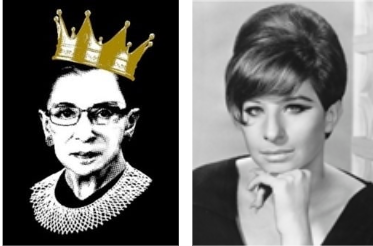 Celebrating and recognizing the diverse contributions of the Jewish people to American culture. Hundreds or organizations around the U.S. will join together to help Americans of all backgrounds discover, explore, and celebrate the vibrant and varied American Jewish experience. Jewish American Supreme Court Justice: Ruth Bader Ginsburg [left] Jewish American Entertainer: Barbra Streisand [right]
Celebrating and recognizing the diverse contributions of the Jewish people to American culture. Hundreds or organizations around the U.S. will join together to help Americans of all backgrounds discover, explore, and celebrate the vibrant and varied American Jewish experience. Jewish American Supreme Court Justice: Ruth Bader Ginsburg [left] Jewish American Entertainer: Barbra Streisand [right]
May 1st
1950: Gwendolyn Brooks becomes the first African American woman to receive the Pulitzer Prize for Poetry, named Library of Congress’s Consultant in Poetry (later called Poet Laureate) in 1985.
May 5th
Cinco de Mayo (Mexico)
Commemoration of the Mexican army’s May 5,1862 victory over France at the Battle of Puebla during the Franco-Mexican War (1861-1867). A year prior, Mexican President Benito Juarez suspended payment of all foreign debts. In response, France invaded Mexico. Mexican soldiers were outnumbered two to one by the better-equipped French army, but in the town of Puebla, the Mexican force prevailed. The victory boosted the Mexican army’s morale and national pride. This day celebrates Mexican culture and heritage, including parades and mariachi music performances. While it is a relatively minor holiday in Mexico, in the United States, Cinco de Mayo has evolved into a commemoration of Mexican culture and heritage, particularly in areas with large Mexican-American populations.

May 5th-6th
Holocaust Remembrance Day (Yom HaShoah)
Yom HaShoah, or Holocaust Remembrance Day, is observed in commemoration for the approximately six million Jews murdered in the Holocaust by Nazi Germany. This day recognizes the Jewish resistance and the strength of the Jewish people. It is a day of mourning and remembrance, as well as education. It is held on the 27th of Nisan (which falls in April or May), unless the 27th would be adjacent to the Jewish Sabbath, in which case the date is shifted by a day.
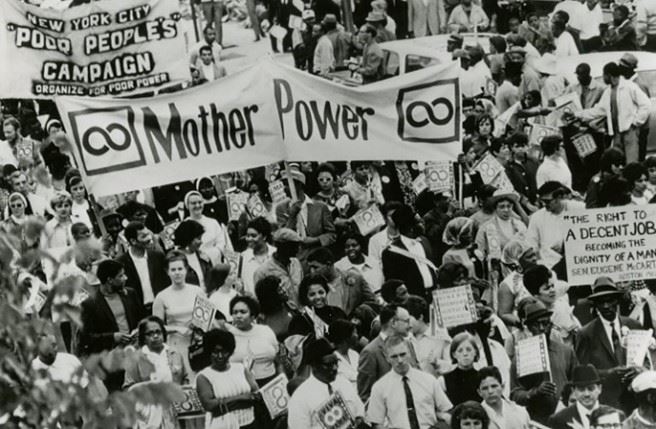 May 12th
May 12th
1968: Mother’s Day March
Following the assassination of Dr. Martin Luther King, Jr. a month earlier, Coretta Scott King, accompanied by Ethel Kennedy, sustained her late husband’s “Poor People’s Campaign” and lead the first wave of demonstrators, thousands of “welfare mothers” on a march through Washington D.C., protesting inequality of wages and demanding economic justice. The Poor People’s Campaign was aimed establishing a fair minimum wage and opportunities for education, not only for Black Americans, but Native American, Puerto Rican, Mexican American, and poor white communities, who pledged themselves to the worthwhile campaign.
May 13th
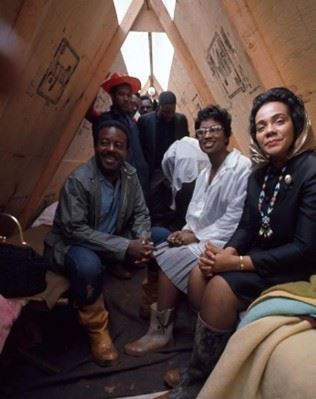
The following day, Resurrection City, a temporary settlement of tents and impermanent shacks, was built on the Mall in Washington, D.C. where they stayed in demonstration for over a month. The funeral procession of assassinated Senator, Robert Kennedy, who, along with his wife, Ethel, had been a public supporter of the campaign, passed through Resurrection City as a nod to the protestors and in posthumous support of American minorities’ right to a decent life, respect for their culture and dignity.
Pictured Right: Coretta Scott King in Resurrection City [Bob Fitch photography archive, © Stanford University Libraries]
May 15th
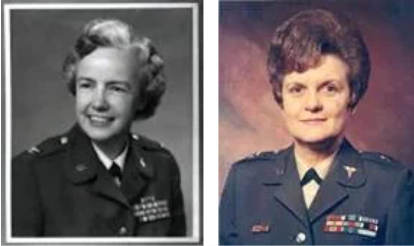 1970 (USA) Anna Mae Hays [left] and Elizabeth P. Hoisington [right] became the FIRST FEMALE US ARMY GENERALS
1970 (USA) Anna Mae Hays [left] and Elizabeth P. Hoisington [right] became the FIRST FEMALE US ARMY GENERALS
May 16th
Global Accessibility Awareness Day
The purpose of Global Accessibility Awareness Day (GAAD) is to get everyone talking, thinking and learning about digital access and inclusion, and the more than One Billion people with disabilities/impairments. From both a civil rights and a business perspective, people with disabilities are underserved by today’s digital products. Digital accessibility refers to the ability of people with disabilities/impairments to independently consume and/or interact with digital (e.g., web, mobile) applications and content. It provides people with disabilities/impairments with the same access to web-based services, content, and other digital products as everyone else. This awareness and commitment to inclusion is the goal of Global Accessibility Awareness Day (GAAD), a global event that shines a light on digital access and inclusion for people with disabilities.
May 17th
International Day Against Homophobia, Transphobia and Biphobia, a global celebration of sexual-orientation and gender diversities. The 17th celebrates the date chosen to honor the decision to remove homosexuality from the International Classifications of Diseases of the WHO in 1990. On this day, 132 countries coordinate international events that raise awareness of LGBT rights. You can celebrate by reading up on the terminology so you can talk about the issues confidently in the workplace.
1954: Brown v. Board of Education of Topeka, Kansas (USA)
The United States Supreme Court issued its decision, Brown v. Board of Education of Topeka, Kansas, prohibiting school segregation and overturning Plessy v. Ferguson the Supreme Court opinion which gave legal backing to the concept of separate but equal public facilities for black people.
May 19th
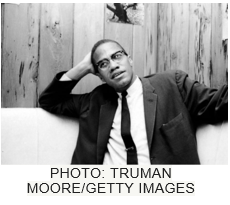 HAPPY BIRTHDAY, MALCOM X (1925- 1965)
HAPPY BIRTHDAY, MALCOM X (1925- 1965)
Born in Omaha, Nebraska, this future civil rights leader lost his father at the very young age of six. Malcom’s mother suffered mental illness and following the loss of his father, her psychological condition deteriorated significantly. When Malcom was 14, she was institutionalized in the State Mental Hospital at Kalamazoo. She remained there for 26 years.
Although he excelled in school, he lost interest when a teacher told him that he should become a carpenter rather than a lawyer. He soon became involved in petty criminal activities and eventually was sentenced to prison. While in prison Malcolm joined the Nation of Islam and replaced his last name with X, a custom among followers as they considered their last names to be that of white slave owners. While in prison, Malcolm educated himself by spending long hours reading and memorizing a dictionary.
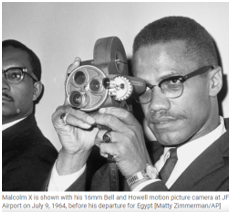 Upon his release from prison, he rose up in the ranks of the Nation of Islam, establishing temples for the organization. Amidst the height of the Civil Rights Movement, from 1955 to 1965, Malcolm challenged Martin Luther King, Jr.’s call for integration and nonviolence and argued for Black independence, civil disobedience and defending oneself “by any means necessary.” By 1963, tensions arose between Malcom and the leader of the Nation of Islam, Elijah Muhammad, about the political direction of the Nation. Malcom traveled to Mecca in 1964 and converted to Sunni Islam, adopting the Muslim name, el-Hajj Malik el-Shabazz. He began to receive death threats from the Nation of Islam and was assassinated on February 21, 1965. His ideas and speeches contributed to the development of Black nationalism and the Black Power Movement.
Upon his release from prison, he rose up in the ranks of the Nation of Islam, establishing temples for the organization. Amidst the height of the Civil Rights Movement, from 1955 to 1965, Malcolm challenged Martin Luther King, Jr.’s call for integration and nonviolence and argued for Black independence, civil disobedience and defending oneself “by any means necessary.” By 1963, tensions arose between Malcom and the leader of the Nation of Islam, Elijah Muhammad, about the political direction of the Nation. Malcom traveled to Mecca in 1964 and converted to Sunni Islam, adopting the Muslim name, el-Hajj Malik el-Shabazz. He began to receive death threats from the Nation of Islam and was assassinated on February 21, 1965. His ideas and speeches contributed to the development of Black nationalism and the Black Power Movement.
May 21st
 1932: Amelia Earhart Putnam becomes the first woman to complete a solo-transatlantic flight by flying 2,026 miles from Newfoundland to Ireland in just under 15 hours.
1932: Amelia Earhart Putnam becomes the first woman to complete a solo-transatlantic flight by flying 2,026 miles from Newfoundland to Ireland in just under 15 hours.
World Day for Cultural Diversity for Dialogue and Development (United Nations)
A day set aside by the United Nations as an opportunity to deepen our understanding of the values of cultural diversity and to learn to live together in harmony.
May 26th
Buddha Purnima or Vesak (Buddhist)
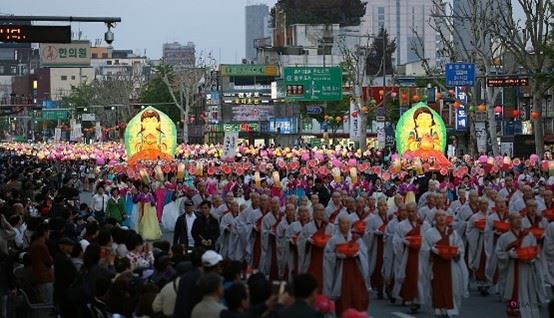 Buddhists in South Asia and Southeast Asia as well as Tibet and Mongolia celebrate Gautama Buddha’s life on this day, memorializing the birth, enlightenment, and death of Lord Buddha. According to the Hindu Calendar, it is celebrated on a full moon day of month Vaishakha.
Buddhists in South Asia and Southeast Asia as well as Tibet and Mongolia celebrate Gautama Buddha’s life on this day, memorializing the birth, enlightenment, and death of Lord Buddha. According to the Hindu Calendar, it is celebrated on a full moon day of month Vaishakha.

